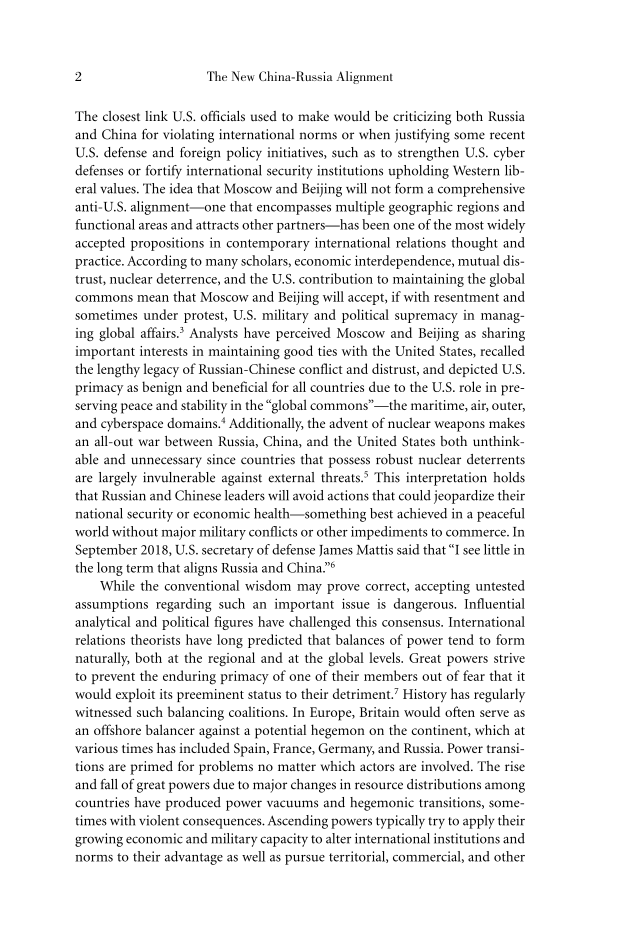2 The New China-Russia Alignment The closest link U.S. officials used to make would be criticizing both Russia and China for violating international norms or when justifying some recent U.S. defense and foreign policy initiatives, such as to strengthen U.S. cyber defenses or fortify international security institutions upholding Western lib- eral values. The idea that Moscow and Beijing will not form a comprehensive anti-U.S. alignment—one that encompasses multiple geographic regions and functional areas and attracts other partners—has been one of the most widely accepted propositions in contemporary international relations thought and practice. According to many scholars, economic interdependence, mutual dis- trust, nuclear deterrence, and the U.S. contribution to maintaining the global commons mean that Moscow and Beijing will accept, if with resentment and sometimes under protest, U.S. military and political supremacy in manag- ing global affairs.3 Analysts have perceived Moscow and Beijing as sharing important interests in maintaining good ties with the United States, recalled the lengthy legacy of Russian-Chinese conflict and distrust, and depicted U.S. primacy as benign and beneficial for all countries due to the U.S. role in pre- serving peace and stability in the “global commons”—the maritime, air, outer, and cyberspace domains.4 Additionally, the advent of nuclear weapons makes an all-out war between Russia, China, and the United States both unthink- able and unnecessary since countries that possess robust nuclear deterrents are largely invulnerable against external threats.5 This interpretation holds that Russian and Chinese leaders will avoid actions that could jeopardize their national security or economic health—something best achieved in a peaceful world without major military conflicts or other impediments to commerce. In September 2018, U.S. secretary of defense James Mattis said that “I see little in the long term that aligns Russia and China.”6 While the conventional wisdom may prove correct, accepting untested assumptions regarding such an important issue is dangerous. Influential analytical and political figures have challenged this consensus. International relations theorists have long predicted that balances of power tend to form naturally, both at the regional and at the global levels. Great powers strive to prevent the enduring primacy of one of their members out of fear that it would exploit its preeminent status to their detriment.7 History has regularly witnessed such balancing coalitions. In Europe, Britain would often serve as an offshore balancer against a potential hegemon on the continent, which at various times has included Spain, France, Germany, and Russia. Power transi- tions are primed for problems no matter which actors are involved. The rise and fall of great powers due to major changes in resource distributions among countries have produced power vacuums and hegemonic transitions, some- times with violent consequences. Ascending powers typically try to apply their growing economic and military capacity to alter international institutions and norms to their advantage as well as pursue territorial, commercial, and other
Document Details My Account Print multiple pages
Print
You have printed 0 times in the last 24 hours.
Your print count will reset on at .
You may print 0 more time(s) before then.
You may print a maximum of 0 pages at a time.

























































































































































































































































































